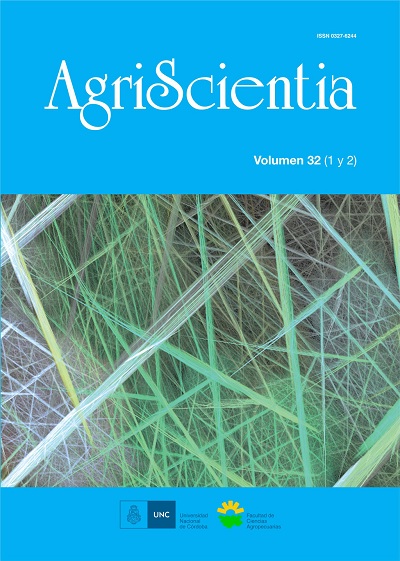Phylogenetic analysis of Groundnut ringspot virus isolates from peanut and identification of potential thrips vectors in peanut crop in Argentina
Main Article Content
Abstract
Groundnut ringspot virus (GRSV), genus Tospovirus, is a thrips-transmitted virus infecting peanuts (Arachis hypogaea L.) in Córdoba province, Argentina. Fourteen viral isolates were recovered from Tospovirus-like symptomatic plants from different peanut fields. Viral isolates as GRSV were identified by serological and molecular tests. Nucleotide and derived amino acid sequence analyses of the nucleocapsid (N) gene indicated a high degree of identity between the GRSV peanut isolates, indicating that there is no molecular variability in the N gene of the GRSV that infects peanuts in the cropping area of Córdoba. In this study, we determined the presence of thrips species in the crop, which can potentially transmit the virus. Thrips were observed in all the evaluated peanut fields. Frankliniella schultzei was the most frequently identified species followed by Caliothrips phaseoli and Frankliniella occidentalis. This work reports the presence of F. schultzei and F. occidentalis in peanuts in Argentina for the first time. These results along with the high degree of similarity between the GRSV peanut isolates suggest that the virus could be transmitted by F. schultzei, which has been cited as its most efficient vector.
Article Details
How to Cite
Phylogenetic analysis of Groundnut ringspot virus isolates from peanut and identification of potential thrips vectors in peanut crop in Argentina. (2015). AgriScientia, 32(1), 77-82. https://doi.org/10.31047/1668.298x.v32.n1.16558
Issue
Section
Short comunications
How to Cite
Phylogenetic analysis of Groundnut ringspot virus isolates from peanut and identification of potential thrips vectors in peanut crop in Argentina. (2015). AgriScientia, 32(1), 77-82. https://doi.org/10.31047/1668.298x.v32.n1.16558





